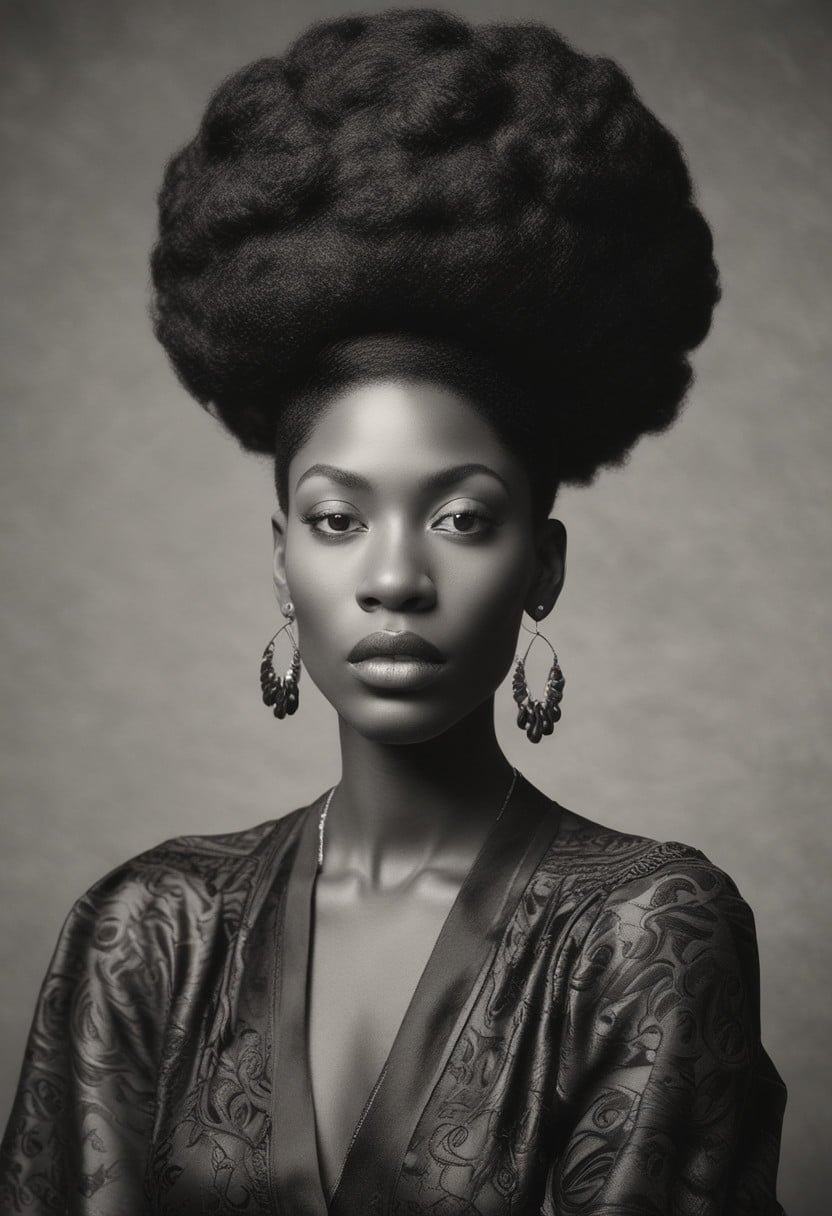
If you’ve ever wondered how often African Americans should oil their scalp to maintain healthy and nourished hair, you’re not alone. In this article, we’ll explore the importance of scalp oiling for black women and provide some expert tips on how often to do it. Additionally, we’ll celebrate some inspiring black women who confidently embrace and rock their natural hair, proving that beauty comes in all textures and styles. Get ready to discover the secrets to a healthy scalp and embrace your gorgeous natural hair with confidence!
Understanding the African American Hair Type
African American hair is known for its unique structure and characteristics. Unlike other hair types, African American hair has a distinct curl pattern and tends to be more fragile and prone to dryness. Understanding the structure of African American hair is essential in caring for and maintaining its health.
The Unique Structure of African American Hair
The structure of African American hair sets it apart from other hair types. It has a tight curl pattern that ranges from S-shaped curls to tight coils. These curls are the result of the hair follicles growing at an angle, causing the hair to curve as it grows. The curl pattern can vary from individual to individual, with some having looser curls while others have tighter coils.
Due to the tight curl pattern, natural oils produced by the scalp, known as sebum, have difficulty coating the entire hair shaft. This leads to dryness and makes African American hair more prone to breakage and damage. Understanding this unique structure is crucial in determining the right hair care routine for African American hair.
The Role of Natural Hair Oil (Sebum) in African American Hair
Sebum plays a vital role in the health of African American hair. It is a natural oil produced by the scalp that helps to moisturize and protect the hair. However, due to the tight curl pattern, sebum has difficulty traveling down the hair shaft, resulting in a lack of moisture and dryness.
Without adequate moisture, African American hair becomes brittle and prone to breakage. It is essential to find ways to supplement the natural oil production and maintain moisture levels to promote healthy hair growth.
The Challenge of Dryness in African American Hair Type
Dryness is a common challenge faced by individuals with African American hair. The tight curl pattern makes it difficult for natural oils to distribute evenly along the hair shaft, leading to dry and brittle hair. Factors such as heat styling, chemical treatments, and environmental conditions contribute to further dryness.
Dryness not only affects the appearance of African American hair but also compromises its health. It leads to increased breakage, split ends, and overall hair damage. Therefore, addressing dryness is crucial in maintaining the health and vitality of African American hair.
Importance of Scalp Oil for African American Hair
Maintaining moisture levels and promoting scalp health are essential for African American hair. Incorporating scalp oil into your hair care routine can help address these concerns effectively.
Maintaining Moisture Levels
Scalp oil plays a crucial role in maintaining moisture levels in African American hair. By applying oil to the scalp, you provide much-needed moisture to the hair follicles and the underlying scalp. This helps to combat dryness and keep the hair hydrated, resulting in softer and more manageable hair.
Preventing Breakage and Hair Damage
Dryness in African American hair can lead to increased breakage and hair damage. Scalp oil helps to nourish the hair follicles, making the hair more resilient and less prone to breakage. It forms a protective barrier on the hair shaft, preventing damage from external factors such as heat and harsh styling.
Promoting Scalp Health and Hair Growth
A healthy scalp is crucial for the overall health of African American hair. Scalp oil helps to promote scalp health by nourishing the hair follicles and stimulating blood circulation. This increased blood flow to the scalp promotes hair growth and helps to maintain a healthy environment for the hair to thrive.
How Often Should African Americans Oil Their Scalp
Finding the right frequency to oil the scalp is essential in maintaining the health of African American hair. Several factors come into play when determining how often you should oil your scalp.
Determining the Frequency Based on Hair Type and Texture
The frequency of oiling your scalp can vary depending on your hair type and texture. Individuals with coarser and drier hair may require more frequent oiling to combat dryness, while those with finer hair might need less frequent oiling. It’s important to listen to your hair and adjust the frequency accordingly.
The Role of Lifestyle and Environmental Factors
Lifestyle and environmental factors also influence how often you should oil your scalp. Factors such as exposure to heat styling, chemical treatments, and harsh weather conditions can increase dryness and necessitate more frequent oiling. Conversely, individuals with a healthier lifestyle and minimal exposure to damaging factors may require less frequent oiling.
Listening to Your Hair’s Needs
Ultimately, the frequency of oiling your scalp should be determined by listening to your hair’s needs. Pay attention to how your hair feels and looks. If it appears dry or lacks luster, it may be a sign that it needs more frequent oiling. On the other hand, if your hair feels weighed down or greasy, you may be oiling it too often.
Choosing the Right Type of Oil for African American Hair
Selecting the right type of oil for African American hair is crucial in promoting its health and manageability. Different oils offer various benefits, and understanding their properties can help you choose the most suitable oil for your hair’s unique needs.
Understanding the Different Types of Hair Oils
There is a wide range of hair oils available in the market, each with its unique properties. Some common types of hair oils include coconut oil, jojoba oil, argan oil, castor oil, and olive oil. These oils differ in their composition, viscosity, and nutrient content, making them suitable for various hair needs.
Benefits of Natural and Organic Oils
Natural and organic oils are often the preferred choice for African American hair. These oils are minimally processed and retain their natural nutrients and properties. They are free from harmful chemicals and additives that may further damage the hair. Natural and organic oils help to moisturize, nourish, and protect the hair, promoting its overall health.
Specific Oils Suited for Different African American Hair Needs
Different African American hair needs require different types of oils. For those dealing with dryness and breakage, heavier oils like castor oil or shea butter can provide intense moisture and nourishment. Individuals looking to enhance shine and manageability may benefit from lighter oils like jojoba or argan oil. Experimenting with different oils can help you identify the ones that suit your hair needs best.
Applying Oil to the Scalp: Step by Step Guide
Proper application of oil to the scalp ensures maximum effectiveness and benefits for African American hair. Follow these steps to ensure optimal results:
Proper Techniques to Apply Oil
Start by parting your hair into sections to ensure even oil distribution. Apply a small amount of oil to your fingertips and gently massage it into your scalp using circular motions. Continue this process until you have covered your entire scalp. Be sure to focus on any areas that are particularly dry or prone to breakage.
Making Sure the Oil Reaches the Scalp
To ensure that the oil reaches the scalp and hair follicles, it is essential to part the hair and apply the oil directly to the scalp, rather than just the hair strands. Massage the oil into the scalp using your fingertips, allowing it to be absorbed by the hair follicles and nourish the roots.
Massaging the Scalp for Better Absorption and Stimulation
Massaging the scalp while applying oil not only helps with the even distribution but also stimulates blood circulation. This increased blood flow promotes hair growth and enhances the effectiveness of the oil treatment. Take your time and enjoy the process, as scalp massage can be incredibly relaxing and beneficial for overall scalp health.
Common Mistakes when Oiling the Scalp
Avoiding common mistakes when oiling the scalp is crucial to ensure the maximum benefits for African American hair. Be mindful of these mistakes to optimize your hair care routine:
Avoiding Over Oil Application
While oiling the scalp is beneficial, over-application can lead to greasy and weighed-down hair. It is essential to apply the oil in moderation and adjust the quantity based on your hair’s needs. Remember that a little goes a long way, and it is better to start with a small amount and add more if necessary.
Not Considering Hair Porosity
Hair porosity refers to how well your hair absorbs and holds moisture. Understanding your hair’s porosity is essential in determining the right amount and frequency of oil application. If you have low porosity hair, it may be more resistant to absorbing oil, and you may need to use less or choose lighter oils. High porosity hair, on the other hand, may require more frequent oiling and heavier oils to retain moisture.
Neglecting the Scalp in Favor of the Hair Strands
When oiling the scalp, it is important to focus on the roots and the scalp rather than solely concentrating on the hair strands. The hair shaft is already “dead” and does not benefit from direct oil application. By directing the oil to the scalp, you ensure that the hair follicles and roots receive maximum nourishment and moisture.
Inspiring Examples of Embracing Natural African American Hair
Embracing natural African American hair has become a powerful movement, with many black women confidently embracing their hair’s natural texture. Here are some inspiring examples of black women who have become advocates for natural hair:
Influential Black Women Embracing their Natural Hair
Celebrities such as Lupita Nyong’o, Solange Knowles, and Viola Davis have been influential in embracing their natural hair and setting a positive example for others. They have challenged societal beauty standards and encouraged women to embrace their natural hair texture, inspiring a whole generation to do the same.
Lessons from the Natural Hair Movement
The natural hair movement has taught us valuable lessons about self-acceptance, embracing diversity, and challenging societal norms. It has empowered individuals to redefine beauty standards and embrace their natural hair journey with confidence and pride.
Real Life Stories and Experiences
Everyday individuals have also shared their stories and experiences of embracing their natural hair, showcasing the beauty and versatility of African American hair. These stories serve as inspiration and encouragement for others who may be on a similar journey, providing a sense of community and support.
Expert Tips for Maintaining Healthy African American Hair
Maintaining healthy African American hair requires a holistic approach to hair care. Here are some expert tips to help you keep your hair vibrant and healthy:
Importance of a Balanced Diet for Healthy Hair
A balanced diet is crucial for healthy hair growth. Consuming a variety of nutrient-rich foods, including fruits, vegetables, lean proteins, and healthy fats, provides the necessary vitamins and minerals for hair health. Nutrients like vitamin E, biotin, and omega-3 fatty acids are particularly important for promoting healthy hair growth.
Staying Hydrated to Boost Hair Health
Drinking an adequate amount of water is essential for overall health, including the health of your hair. Hydration helps to maintain the moisture levels in your scalp and hair, preventing dryness and breakage. Aim to drink at least 8 glasses of water per day to keep your hair hydrated from within.
Regular Hair Trimming to Prevent Split Ends
Regular hair trims are essential for preventing split ends and maintaining the overall health of African American hair. Trimming every 6-8 weeks helps to remove any damaged or split ends, preventing them from traveling up the hair shaft and causing further damage. This promotes healthier and more manageable hair.
Addressing Common Scalp Conditions in African Americans
African Americans may be more prone to certain scalp conditions, and addressing them is crucial for maintaining scalp health. Here are some common scalp conditions and tips for managing them:
Dealing with Dandruff and Scalp Irritations
Dandruff and scalp irritations can be common concerns for African Americans. Using anti-dandruff shampoos that contain ingredients such as zinc pyrithione, selenium sulfide, or ketoconazole can help reduce dandruff and relieve scalp irritations. Additionally, maintaining good scalp hygiene and avoiding excessive scratching can prevent further irritation.
Treating Alopecia and other Hair Loss Conditions
Alopecia and other hair loss conditions can be emotionally challenging. Consultation with a dermatologist or trichologist is recommended to determine the cause and appropriate treatment options. Treatments may include topical medications, oral medications, laser therapy, or hair transplantation, depending on the severity and underlying cause of the hair loss.
Understanding Psoriasis and Seborrheic Dermatitis
Psoriasis and seborrheic dermatitis can cause scalp redness, irritation, and flaking. It is important to seek medical advice for an accurate diagnosis and appropriate treatment options. Medicated shampoos, topical creams, and scalp treatments prescribed by a healthcare professional can help manage these conditions and provide relief.
The Impact of Hair Care Products on Scalp Health
The choice of hair care products can greatly impact the health of your scalp and hair. Understanding the ingredients to avoid and the benefits of natural hair care products is essential in maintaining scalp health.
Chemicals to Avoid in Hair Care Products
Some chemicals commonly found in hair care products can be harsh and damaging to the scalp and hair. These include sulfates, parabens, and silicones. These chemicals can strip the hair and scalp of natural oils, leading to dryness, irritation, and potential long-term damage. Opt for products labeled as sulfate-free, paraben-free, and silicone-free.
The Benefits of Natural Hair Care Products
Natural hair care products offer numerous benefits for African American hair. They are often made with natural and organic ingredients that nourish and protect the hair without causing harm or irritation. Natural products also tend to be free from harsh chemicals and are more environmentally friendly, making them a safer and more sustainable choice.
Finding the Right Hair Care Routine for You
The right hair care routine for African American hair can vary from person to person. It is important to experiment with different hair care products, techniques, and routines to find what works best for you. Pay attention to how your scalp and hair respond to different products and adjust accordingly.
In conclusion, understanding the unique structure and needs of African American hair is essential in maintaining its health and vitality. Regular scalp oiling, choosing the right type of oil, and proper application techniques can greatly benefit African American hair. Embracing natural hair and learning from influential black women who have done the same can also be a source of inspiration. By taking a holistic approach to hair care, addressing common scalp conditions, and using suitable hair care products, individuals with African American hair can achieve healthy and beautiful locks.











